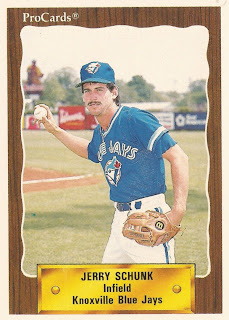Randy Knorr didn't play every day. But when he did play, he was ready.
That showed in September 1993, when the catcher came in for the resting starter Pat Borders and hit a three-run home run, The Associated Press wrote.
"I talk to a lot of the guys as much as I can to be ready when I get to play," Knorr told The AP after that Toronto win. "You're anxious and you want to do well."
It was a role Knorr played throughout his career, one that spanned 11 major league seasons, with Knorr having to be ready for whenever his team needed him. In those 11 seasons, Knorr never got into more than 45 major league games in any one year.
More recently, Knorr has made himself ready to be a major league bench coach, after a post-playing career spent as a manager in the minors. It has also even been suggested he may already be ready for a career as a manager in the majors.
Knorr's playing career began in 1986, taken by the Blue Jays in the 10th round of the draft, out of Baldwin Park High School in California.
Knorr played that first year at short-season Medicine Hat. He didn't make AA until 1990, at Knoxville. He moved to AAA Syracuse in 1991. That September, he debuted in Toronto.
Knorr got into three games for the Blue Jays that September, getting one at bat. He returned for eight more games in 1992, with 19 at bats.
In 1993, Knorr got into 39 games for the Blue Jays. Later in September, Knorr was a home run away from the cycle, getting a single, double, and triple in a win against Milwaukee.
Knorr went on to get into 40 games in 1994 and 45 in 1995. He went on to play in the Astros, Marlins and Rangers organizations, getting brief major league looks each year through 2000.
In 2001, Knorr signed on with the organization he remains with, the Expos. He got into 34 final games that season, hitting a two-run home run in early April off the Mets' Steve Trachsel. "I think he threw a pitch he didn't want to throw," Knorr told The AP afterward.
Knorr continued playing at AAA with the Expos through 2004, first at Ottawa, then at Edmonton.
His playing days over, Knorr stayed with the franchise, signing on as manager at single-A Savannah for 2005. He has since served as manager at Potomac, Harrisburg and Syracuse. He's also served as Nationals bullpen coach in 2006 and 2009.
Knorr served as Syracuse manager in 2011, leading the team to a 66-74 record. Despite that mark, Knorr saw positives, especially after a 27-42 start.
"We could have just gone in the tank," Knorr told The Syracuse Post-Standard. "When we were 15 games under .500, we could have gone the other way and just fallen off. But the guys didn’t. They kept going. They kept pushing it."
It was his work with the Nationals minor leaguers that got Knorr a spot as Nationals bench coach for 2012. The Washington Times wrote that Knorr would also be on the short list to succeed Davey Johnson as Nationals manager.
"I think that [experience in the system] probably put me on the top of the list because I have had [those players] and have a good relationship with most of them," Knorr told The Times. "I feel like I can get the most out of them."
- Toledo Blade, Associated Press, Sept. 2, 1993: Knorr homer sparks Toronto win
- Rome News-Tribune, Associated Press, April 8, 2001: Expos romp
- Syracuse Post-Standard, Sept. 6, 2011: Poliquin: The Syracuse Chiefs have ended their IL season with this giddy thought: Wait 'til next year!
- Washington Times, Nov. 17, 2011: Washington Nationals promote Randy Knorr to bench coach
Players/Coaches Featured:1,053
Made the Majors: 655 - 62.2%
Never Made Majors: 398-37.8%
5+ Seasons in the Majors: 286
10+ Seasons in the Minors: 169



























